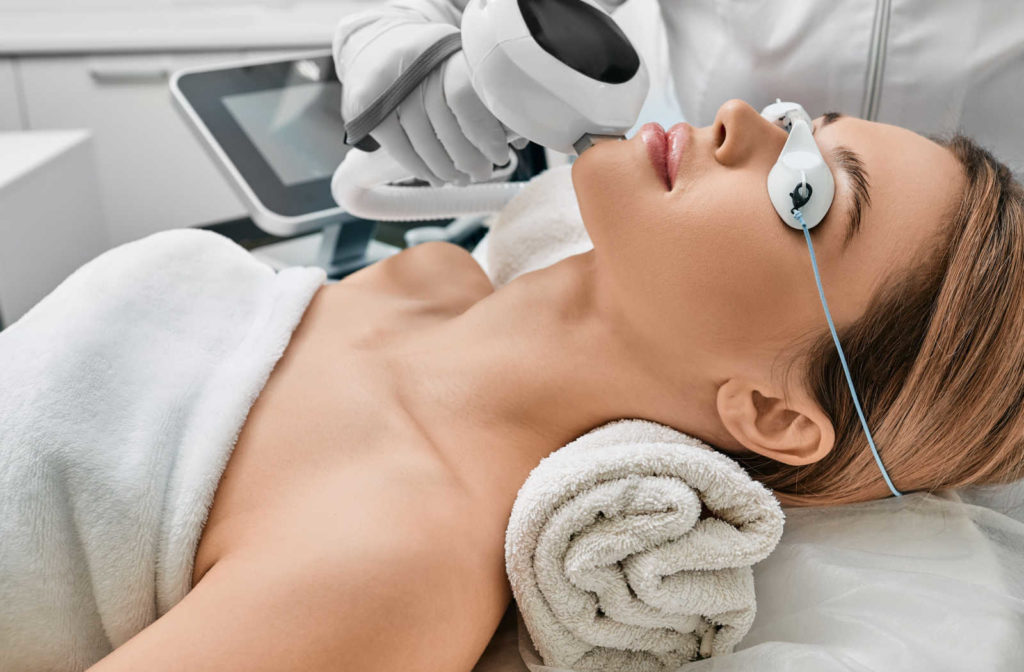Rosacea is a condition that generally affects the skin on your face. Bumps on the skin can be mistaken for acne, and redness can look like you’re blushing more than usual.
While rosacea is not dangerous, it can significantly impact your self-confidence and make you more self-conscious of your appearance. There is no cure for rosacea, but laser treatments under the supervision of a medical professional can help reduce the symptoms of rosacea so you can feel more confident in your skin.
What Is Rosacea?
Rosacea is a skin condition that causes redness, flushing, and visible blood vessels on your face. The exact cause of rosacea is unknown but could be a combination of genetic and environmental factors.
The condition can affect anyone but is more prominent in fair-skinned middle-aged women. You’re more likely to get rosacea if there’s a family history of the condition.
Symptoms of Rosacea
Since rosacea is an inflammatory condition, the most noticeable symptom is redness on your cheeks, nose, chin, and forehead. Other symptoms can include:
- Persistent facial redness or flushing
- Small visible blood vessels in the face
- Small pimple-like bumps on your face that sometimes contain pus
- Burning or stinging sensation on the skin
- Dry skin
- Enlarged pores
- Enlarged nose
- Dry, irritated, swollen eyes and eyelids (ocular rosacea)
It’s important to note that symptoms can vary from person to person and may come and go, such as flaring for some weeks, fading, and then returning. In some cases, rosacea may be mistaken for acne, so it’s best to consult a medical professional for a proper diagnosis and treatment plan.
What Causes Rosacea?
The exact cause of rosacea is unknown, but several factors can contribute to the development of the condition, including:
- Genetics: Rosacea may run in families.
- Environmental triggers: Environmental factors, such as sun and wind exposure, hot drinks, spicy food, and certain beverages, may trigger rosacea symptoms.
- Demodex mites: Some people have a heightened sensitivity to these mites that live on the skin. An increased number of these mites can also irritate the skin.
- Products: Some cosmetic, skin or hair care products can cause rosacea.
Your risk for developing rosacea can increase if you:
- Have light skin, blonde hair, and blue eyes
- Are between 30 and 50 years old
- Are a woman
- Have family members with rosacea
- Had severe acne
- Smoke

How to Treat & Manage Rosacea
Treatments can help you manage the symptoms of rosacea. These can include good skin care, medication, or laser therapy.
Laser Treatment for Rosacea
Laser treatments, such as a non-ablative laser, can diminish the appearance of blood vessels. A non-ablative laser gently heats the skin to promote collagen production, which results in smoother and more youthful-looking skin.
This laser treatment is non-invasive, has minimal discomfort, and a short recovery time. For desired results, you may need more than 1 treatment. Some side effects can include redness, dry skin, and mild swelling.
Skin Care Products
Using gentle, non-irritating skin care products and avoiding harsh ones can help prevent skin irritation and sensitivity. Good skincare products, such as SkinCeuticals, help prevent damage, protect healthy skin, and correct signs of previous damage.
A rosacea skincare routine with SkinCeuticals products can include the following:
- Soothing cleanser: Massaged twice daily.
- Serum 10: Applied to the face and neck every morning.
- Hydrating gel: Applied to the face and neck twice daily.
- Eye balm: Gently massaged to the orbital bone
Topical & Oral Medications
Creams that contain ingredients such as metronidazole, azelaic acid, and ivermectin can help reduce redness, swelling, and pimple-like bumps. Oral antibiotics, such as doxycycline, can treat moderate to severe rosacea.
Lifestyle Changes
These can include identifying and avoiding triggers that cause rosacea flare-ups, such as sun exposure, stress, and certain foods and drinks, protecting your face, and treating your skin gently, which can help reduce symptoms.
Stop Covering Up Your Rosacea
Living with rosacea can be challenging. And understandably, many people with the condition may feel self-conscious or embarrassed about their appearance. However, it’s important to remember that rosacea is a medical condition that affects many people and is not something to be ashamed of.
Instead of covering up rosacea with heavy makeup, consider seeking treatment and addressing the root cause.
Get Your Confidence Back
If the emotional impact of rosacea is affecting your quality of life, contact Iconic Beauty Aesthetics. We can develop a personalized treatment plan for your specific needs and symptoms.
With the right management, many people with rosacea can control their symptoms and enjoy clearer, healthier-looking skin.